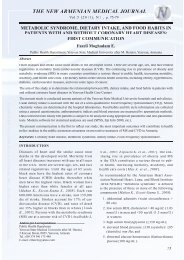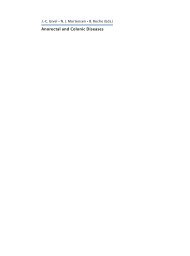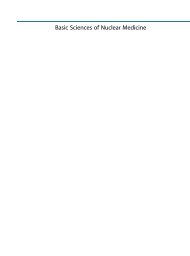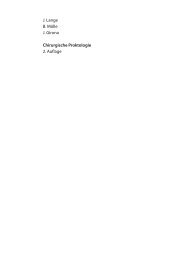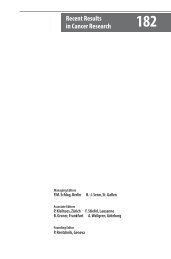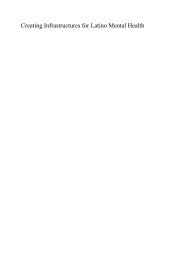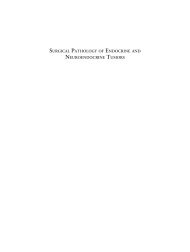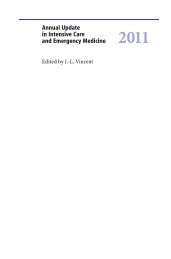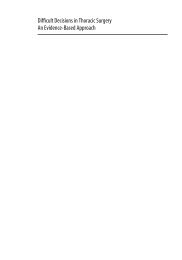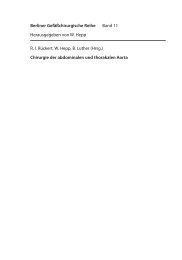Acute Leukemias - Republican Scientific Medical Library
Acute Leukemias - Republican Scientific Medical Library
Acute Leukemias - Republican Scientific Medical Library
Create successful ePaper yourself
Turn your PDF publications into a flip-book with our unique Google optimized e-Paper software.
a 17.3 · Results with Allogeneic Transplantation for High-Risk ALL 217<br />
Table 17.2. Allogeneic transplantation for ALL in CR1<br />
Study No. Med. age (yrs) Preparative GVHD<br />
II-IV GVHD3 3-yrs DFS%<br />
pts<br />
regimen<br />
prophylaxis<br />
Wingard, 1990 [23] 18 24 (5–36) CY/TBI CSA +/– MP 8 42<br />
Blaise, 1990 [17] 25 22 (4–36) CY/fTBI, ML/fTBI<br />
CY/ML/fTBI<br />
MR 7 71<br />
Chao, 1991 [18] 53 28 (1–45) Ara-C/CY/TBI CSA +/– MP 6 61<br />
CY/TBI<br />
VP-16/TBI<br />
MTX +/– MP<br />
Doney, 1991 [20] 41 22 (18–50) CY/fTBI or<br />
Single dose TBI<br />
MR 7 21 (5 yrs)<br />
Sutton, 1993 [21] 184 25 (15–44) CY/TBI<br />
MR 15 deaths 49.5 (6 yrs)<br />
(retrospective<br />
review)<br />
(majority)<br />
Vey, 1994 [22] 29 24 (16–41) CY/TBI CSA/MTX 7 62 (8 yrs)<br />
DeWitte, 1994 [19] 22 15–51 CY/TBI CSA NR 58<br />
CY, cyclophosphamide; TBI, total body irradiation; fTBI, fractionated TBI; VP-16, etoposide; MR, multiple regimens; NR, not reported;<br />
CSA, cyclosporine; MTX, methotrexate; MP, methylprednisolone.<br />
40 years of age were assigned to allogeneic SCT if they<br />
had an HLA-matched sibling donor. Patients between<br />
ages 40 and 50, and those under the age of 40 without<br />
a matched sibling donor, were further randomized to<br />
consolidation chemotherapy or autologous SCT using<br />
bone marrow purged with antibodies or mafosfamide.<br />
Consolidation chemotherapy consisted of three monthly<br />
courses of daunorubicin or zorubicin, Ara-C, and asparaginase<br />
followed by long-term maintenance therapy.<br />
The transplant preparative regimen consisted of TBI<br />
and cyclophosphamide. The study separately evaluated<br />
high- and standard-risk subsets. High-risk was defined<br />
as having one or more of the following factors: presence<br />
of the Ph chromosome, null ALL, age > 35 years, WBC<br />
count > 30´10 9 /L, time to CR >4 weeks. The remaining<br />
patients were considered standard risk.<br />
This study showed that survival at 10 years was significantly<br />
greater for the allogeneic SCT group compared<br />
to consolidation chemotherapy (46% SCT vs.<br />
31% chemotherapy, p=0.04). Furthermore, when these<br />
groups were stratified into high and standard risk, there<br />
was a highly significant benefit for allogeneic SCT in the<br />
high-risk subset, but no statistically significant benefit<br />
seen for the standard risk subset (high risk: 44% SCT,<br />
11% chemotherapy, p=0.009; standard risk: 49% SCT,<br />
43% chemotherapy, p=0.6) [24, 25]. There was no sta-<br />
tistically significant difference in outcome between patients<br />
who received autologous SCT versus consolidation<br />
chemotherapy (34% SCT, 29% chemotherapy,<br />
p=0.6), with no difference detected in either the highor<br />
standard-risk subset.<br />
The United Kingdom <strong>Medical</strong> Research Council’s<br />
(MRC) UKALL XII/Eastern Cooperative Oncology<br />
Group (ECOG) E2993 is also conducting a prospective<br />
trial to define the role of allogeneic SCT, autologous<br />
SCT, and conventional dose chemotherapy in adult patients<br />
with ALL in CR1. Initiated in 1993, over 1200 patients<br />
have been enrolled to date. All patients received<br />
two phases of induction therapy, and continued to allogeneic<br />
SCT if they achieved CR and had a histocompatible<br />
donor. The remaining patients were randomized to<br />
standard consolidation/maintenance therapy for 2.5<br />
years vs. a single autologous SCT. The conditioning regimen<br />
for both allogeneic and autologous transplants<br />
was fractionated TBI (1320 cGy) and VP-16 (60 mg/<br />
kg). Based on the data presented in an abstract in<br />
2001 [26], 239 patients received an allogeneic SCT (170<br />
Ph–) and 291 patients received chemotherapy or autologous<br />
SCT. The overall event-free survival (EFS) for the<br />
allogeneic SCT group was 54 vs. 34% (p = 0.04) for the<br />
chemotherapy or autologous BMT group. Excluding<br />
the t(9;22) karyotype, when patients were stratified into



